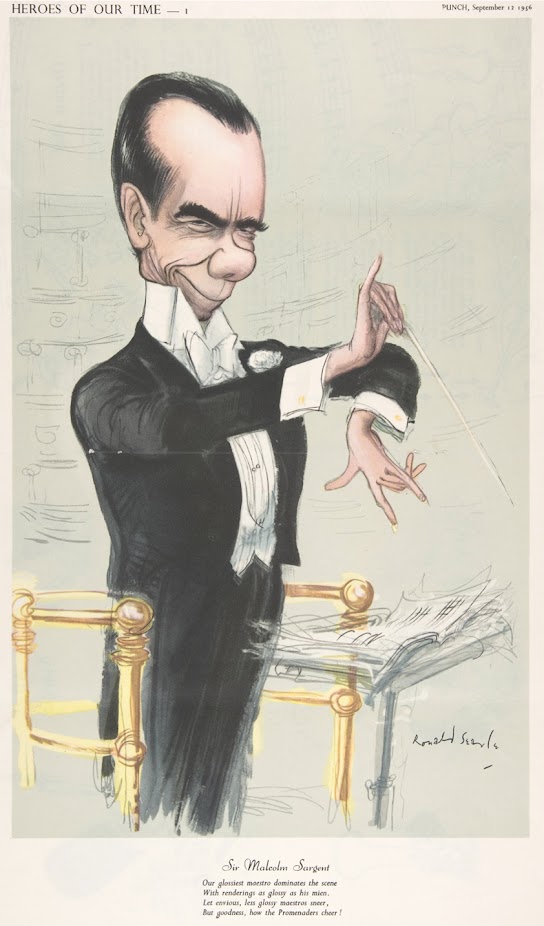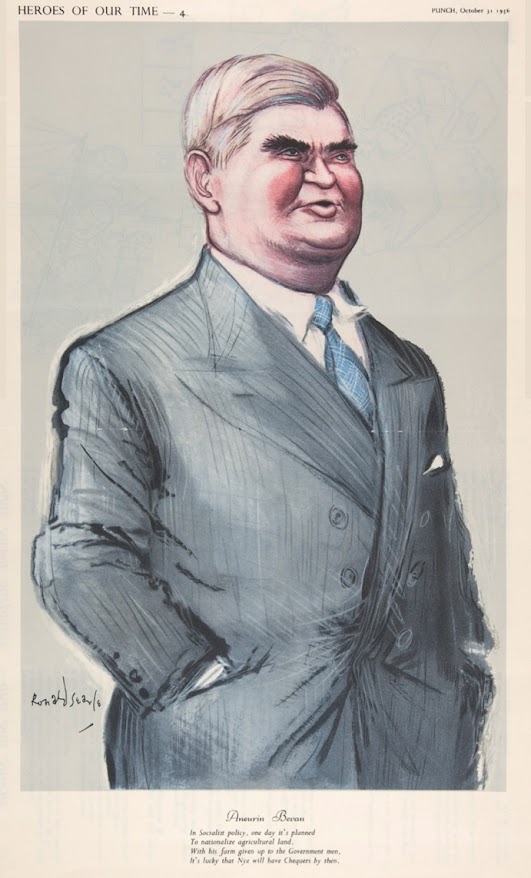 |
| © Yevonde Portrait Archive / Mary Evans Picture Library |
The son of a railwayman, Ronald Searle was born in Cambridge on 3 March 1920, and educated in the town at the Boys' Central School. He started work as a solicitor's clerk, and then joined the hire purchase department of the co-operative Society, studying in the evenings and later full-time at the Cambridge Daily News from the age of fifteen.
Enlisting in the Royal Engineers at the outbreak of the Second World War, he spent time in Kirkcudbright, where he encountered evacuees from St. Trinian's, a progressive girls' school situated in Edinburgh.
This resulted in his first cartoon for Lilliput, published in October 1941, and later developed into one of his most famous creations, through a series of books and their cinematic spin-offs. Remarkably, he survived the horrific experiences of the Changi Camp, Singapore as a Japanese prisoner-of-war and managed to produce a visual record of life in a prison camp.
On his return to England in 1945, he exhibited the surviving pictures at the Cambridge School of Art, and published Forty Drawings. The exhibition and volume together established his reputation as one of Britain's most powerful draughtsmen, and led to several opportunities to record the atmosphere of post-war Europe. He contributed to Punch and these drawings crystallised in, The Female Approach (1949). Throughout the fifties, he produced a large variety of illustrations, which together seemed present a guide to life in Britain in the 1950's.
Such was his success that his rejection of family and country in a move to Paris in 1961 came as a great surprise. However, it offered a fresh start, resulting in several solo shows, including a major exhibitions at the Bibliotheque Nationale, Paris, the Berlin-Dahlem Museum and the Wilhelm-Busch-Museum, Hanover. He also reached a new audience with his contributions to film and television, most notably The Magnificent Men in their Flying Machines (1965).
Note: Searle did so many works that I want to post here, that I will post them in two separate series: 1940-1960, and at a later date: 1961-2007.
For a more detailed biography see part 1, and for earlier works, see parts 1 - 9 also.
This is part 10 of a 13-part series on the works of Ronald Searle, dated 1940-1960:
1955 The Rake's Progress by Ronald Searle:
 |
| Front Cover |
 |
| Dedication |
 |
| 3: Temptation |
 |
| 5: Downfall |
 |
| 6: Ruin |
 |
| 6: Ruin |
 |
| The Actor |
 |
| The Athlete |
 |
| The Doctor |
 |
| The Don |
 |
| 6. Curtain (The Dramatic Critic) |
 |
| The Great Lover |
 |
| The Humourist |
 |
| The M.F.H. |
.jpg) |
| The M.P. (Member of Parliament) |
 |
| The Painter |
 |
| The Poet |
 |
| The Trade Union Leader |
 |
| Why don't you let down your hair or something? |
 |
| The End |
1956 Merry England etc. by Ronald Searle published by Perpetua Books, London:
 |
| Front Cover |
 |
| 'Dear Mummy...' |
 |
| "Looks like mutiny…" |
 |
"Sorry!"
"Sorry!" |
 |
| Art |
 |
| Cricket |
1956 Punch magazine as Picasso might have seen it:
 |
| as Picasso might have seen it |
 |
Franz Hals
"Laughing Cavalier" |
 |
Franz Hals
"Laughing Cavalier" 1624
oil on canvas 83 x 67.3 cm
Wallace Collection, London |
 |
George Frederic Watts
''Hope" |
 |
George Frederic Watts
''Hope" 1886
oil on canvas 142.2 x 111.1
Tate, London |
 |
John Everett Millais'
"The Boyhood of Raleigh" |
 |
John Everett Millais
"The Boyhood of Raleigh" 1870
oil on canvas 120.6 x 142.2 cm
Tate, London |
 |
Sir Edwin Landseer
"Monarch of The Glen" |
 |
Sir Edwin Landseer
"Monarch of The Glen'" 1851
oil on canvas 163.8 x 168.9 cm
Scottish National Gallery, Edinburgh |
1956 Punch magazine Signing Off series: |
| Cordially yours |
 |
| Ever yours |
 |
| Your loving Son... |
 |
| Your most obedient servant |
 |
| Yours in haste… |
 |
| Yours sincerely |
 |
| Yours till the cows come home |
1956 The Investigator by Reuben Ship:
 |
| Front Cover |
 |
| Frontispiece |
 |
| "What is this dump anyway? I can't see anything. It's so foggy." |
 |
| "You can't just barge in here and expect to change things overnight!" |
 |
| "Just a minute, Judge. It seems to me that this undertaking of ours is not without certain dangers..." |
 |
| "I deny that any subversive elements gained entry at all." |
 |
| "Your name is Karl Marx?" |
 |
| "I am the Chief! I am the Chief!" |
1956-57 Punch magazine Heroes of Our Time:
 |
1956 If Music be the Food of Love…
Punch magazine |















.jpg)










































.jpg)


%20Russell%20original%20artwork.jpg)






No comments:
Post a Comment
Note: only a member of this blog may post a comment.